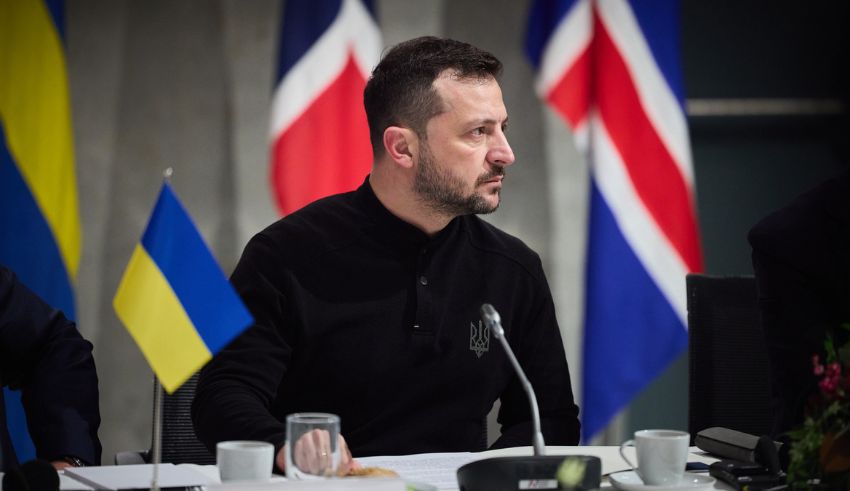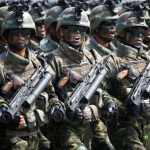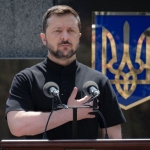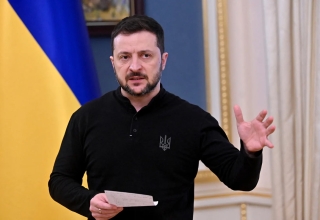
Declaring that Ukraine will soon be dragged into a new front and maybe confronted with North Korean forces on the battlefield, Ukrainian President Volodymyr Zelenskyy issued a harsh warning on the expanding scope of the ongoing war. In a recent national lecture on Telegram, Zelenskyy underscored the gravity of the situation by pointing out that the North Korean military “could appear on the battlefield any day any day,” a move he described as a direct result of Western unwillingness to firmly defend Ukraine. Emphasizing the need for more fierce worldwide support against what he called “growing Russian terror,” he added, “Ukraine will be forced to actually fight against North Korea in Europe.”
Zelenskyy’s comments coincide with a recent assessment by Ukrainian intelligence suggesting that North Korean troops would be dispatched to active fighting zones as early as October 27 or 28, a situation the Ukrainian president has termed as “a clear escalation by Russia.” The scenario has alarmed allies both inside Europe and NATO as Zelenskyy and his government urge a rapid intensification in pressure on Russia and forceful military aid from outside partners. Zelenskyy pointed out that the lack of robust support just encourages more escalatory acts by Russian President Vladimir Putin, therefore pushing Ukraine into ever more difficult and dangerous ground.
Evidence of North Korean Troop Arrival into Russia
Increasing facts also point to a major new phase in the conflict; information from the Defense Intelligence of Ukraine over the weekend showed that North Korean troops were already en route to the front lines. This week’s data from South Korea’s National Intelligence Service (NIS) shows North Korea’s preparing to send “thousands” of troops to assist Russia’s failing attempt in Ukraine. This would represent a significant shift in the struggle since North Korean help might give Russia more troops and logistical support for its operation against a robust Ukrainian resistance.
Since then, the U.S. and NATO allies have backed these claims; White House spokesman John Kirby has claimed that North Korea allegedly transferred at least 3,000 troops to eastern Russia, where they are supposed to be getting training for ultimate deployment in Ukraine. Emphasizing the geopolitical consequences should these North Korean troops reach the front lines Kirby stated, “if North Korean soldiers do enter into combat, this development would show Russia’s increasing desperation in her war against Ukraine.” Including North Korean troops would show a significant commitment from the isolated nation to support Russia, whose military strategy seems to be failing among mounting deaths and diplomatic isolation.
NATO’s Strategic Problems and World Reaction
Reacting to the prospect of North Korean troops accompanying Russian forces, friends of Ukraine have acted quickly and begun talks inside NATO. These events mean that Monday a delegation from South Korea is scheduled to meet with NATO officials in order to provide a comprehensive briefing on the rising threat North Korean involvement involves. Following this conference, NATO Secretary General Mark Rutte is expected to interview the media offering more analysis of the alliance’s response and possible options to halt more escalation.
Scholars believe that North Korea’s participation in Ukraine reveals the geopolitical alignment of the isolated nation with Russia against Western influence. Still, their involvement most definitely fuels already significant geopolitical issues in the region to get worse. A NATO response to North Korean involvement might show a change in the military posture of the alliance considering possible ramifications on force deployments, intelligence sharing, and economic penalties against Russia and North Korea. While diplomatic diplomacy and high-level conversations already underway define the road forward, NATO’s future actions will be vital in deciding the trajectory of the crisis and averting more escalatory steps by Russia and her allies.
For Zelenskyy, the prospective deployment of the North Korean military highlights the need for more strong Western backing since Ukraine regularly encounters difficult external difficulties. He has highlighted repeatedly how crucial it is for major, coordinated help to prevent Russia from continuing its offensive with outside military support. “These are the cases whereby the lack of stronger decisions made by partners in favor of Ukraine only fuels Putin’s increasing investment in terrorism,” Zelenskyy added. Alerting nations to provide necessary military systems, weapons, and financial resources, he advised against delay or limited help hurrying to empower Russia’s new partnerships.
According to Ukrainian officials, the deployment of North Korean forces may compromise Ukraine’s military plans, therefore possibly stretching resources and demanding new strategies to counter their particular battle methods. Zelenskyy also emphasized the need for political unity among friends since slow or divided responses would weaken Ukraine’s resilience. “Right now, strong support and aggressive action are really crucial. Every delay exposes a rising threat spanning many nations that demands absolute instant commitment from European, American, and Asian allies.
Keep Reading
Consequences for Future Policy and World Security
With effects on countries outside of Europe, the expected military involvement of North Korea into the Ukraine crisis begs more fundamental issues about international security. Experts warn that North Korea’s membership might signal the start of more broad alliances including isolated or hostile nations like Iran, Venezuela, or other states rebuffing Western impact. North Korea’s involvement might result in military cooperation and business partnerships with these countries, therefore providing a multi-front challenge for Western powers advocating coordinated responses in both military and diplomatic realms.
For Ukraine, a conflict involving North Korean soldiers creates degrees of complication since its military will have to adapt to somewhat different counter operations than those of Russian forces. Experts believe that NATO’s support will be crucial in providing Ukraine not just with weapons but also with specialized training geared to cope with the evolving nature of the battlefield. Among the cooperative projects might include increased NATO involvement in real-time satellite monitoring, intelligence-sharing programs, and continual military support to stop and neutralize any future Russian escalation.
Getting ready for a fresh war arena encompassing Ukraine
With Ukraine negotiating the potential of North Korean troops entering its territory, the stakes for world security have risen higher than ever. Zelensky’s warnings suggest that friends of Ukraine have to adapt with new strategic acumen and speed to match the evolving conditions. High-stakes diplomatic talks are about to take place, so the response of the global community in the next weeks will determine the direction of the conflict and whether Ukraine can withstand maybe more coordinated and increased opponent presence.
As the world muses over the ramifications of North Korea’s presumably involvement, the attractiveness of the Ukrainian president for audacious, coherent action strikes a great resonance. Should Western partners accept Zelenskyy’s call and provide quick, all-encompassing assistance, Ukraine would be more positioned to confront the forthcoming obstacles. Global cooperation, decisive action, well defined strategic emphasis, and shifting war could at last be rather crucial in deciding the fate of Ukraine and the larger world order.

























